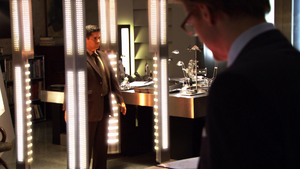Holoband avatar scanner: Difference between revisions
More actions
No edit summary |
→Notes: rm extraneous info in first sentence |
||
| Line 9: | Line 9: | ||
== Notes == | == Notes == | ||
Similar technology is in use today for [[w:3D scanning|3D scanning]] | Similar technology is in use today for [[w:3D scanning|3D scanning]]. While light and laser scanners are able to scan the exterior of a surface, x-rays and magnetic resonance technologies are able to pass through materials, not only scanning surface area underneath clothing (i.e. the skin) but also beyond the epidermal layer. | ||
The deployment of "backscatter x-ray" technologies at airport terminals post-9/11 raised various concerns from privacy groups, not only given the level of body detail that such devices capture but also how that data is both stored and accessed.<ref>{{cite_web|url=https://www.sciencedirect.com/science/article/pii/S1687850714000168|title=ScienceDirect.com: Radiation exposure and privacy concerns surrounding full-body scanners in airports|date=April 2014|accessdate=20 September 2020|last=Accardo|first=Julie; et al.|format=|language=}}</ref> | The deployment of "backscatter x-ray" technologies at airport terminals post-9/11 raised various concerns from privacy groups, not only given the level of body detail that such devices capture but also how that data is both stored and accessed.<ref>{{cite_web|url=https://www.sciencedirect.com/science/article/pii/S1687850714000168|title=ScienceDirect.com: Radiation exposure and privacy concerns surrounding full-body scanners in airports|date=April 2014|accessdate=20 September 2020|last=Accardo|first=Julie; et al.|format=|language=}}</ref> | ||
== References == | == References == | ||
Revision as of 16:12, 24 September 2020

A holoband avatar scanner is a three-dimensional scanning instrument using both light and some form of either resonance or backscatter x-ray to scan the surface of a person's body, allowing for the generation of an avatar based on the physical appearance for each unique holoband user.
The instrument is deployed in various retail establishments as, upon purchase of the holoband, users are scanned for the creation of their digital avatars. The technology has no adverse medical effects, although users experience tingling sensations during the scanning process.
Daniel Graystone scans Joseph Adama for his avatar prior to introducing Adama to Zoe Graystone's avatar (CAP: "Pilot").
Notes
Similar technology is in use today for 3D scanning. While light and laser scanners are able to scan the exterior of a surface, x-rays and magnetic resonance technologies are able to pass through materials, not only scanning surface area underneath clothing (i.e. the skin) but also beyond the epidermal layer.
The deployment of "backscatter x-ray" technologies at airport terminals post-9/11 raised various concerns from privacy groups, not only given the level of body detail that such devices capture but also how that data is both stored and accessed.[1]
References
- ↑ Accardo, Julie; et al. (April 2014). ScienceDirect.com: Radiation exposure and privacy concerns surrounding full-body scanners in airports (backup available on Archive.org) (in ). Retrieved on 20 September 2020.
